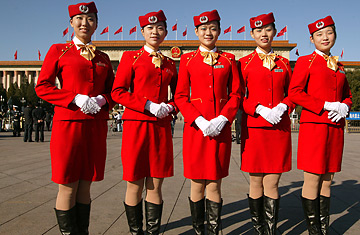
Chinese delegate hostesses in Tiananmen Square during the opening ceremony of the 17th Party Congress at the Great Hall of the People in Beijing, October 15, 2007.
Beijingers have a reputation in China for aloofness and a dry, self-mocking wit. According to Wang Shuo, China's most famous modern novelist, it's a sense of irony developed over centuries as a way of living with the fallout from the capital's endless factional power struggles. If so, the capital's 17 million residents are getting an excellent opportunity to test their famous detachment this week as Beijing hosts the 17th National Congress of the Chinese Communist Party. The get-together, held once every five years, sees senior cadres of the 70 million-strong Party gather to hammer out what policies the central government will pursue until the next meeting. More importantly to many, they also decide who will be implementing those policies — and who will be going back home to brush up a bit more on their Das Kapital.
The daily traffic snarls caused by blocking off some of the city's main arteries so that the 2,000-plus delegates' black limousines can shuttle back and forth from their hotels to the Great Hall of the People in Tiananmen Square is enough to test anyone's sense of humor. But when the meeting's fourth day dawned to blue skies and sunshine, one Beijinger, who didn't want his name used for obvious reasons, joked that the absence of the dirty gray cloud of polluted mist that typically hangs over the city must have been organized for the meeting: "They'll use it for the Olympics. It's special technology with Chinese characteristics like the stuff they use to keep the leaders' hair black."
But regardless of what the capital's average citizens might think, the meeting is viewed with deadly seriousness by the Party, which choreographs every detail with an obsessiveness that makes a moon landing look sloppy. Tens of thousands policemen and other law enforcement officers are a visible sign of their precautions; other preparations have been continuing for months. Previous Congresses had been preceded by a tightening of control on those whom the authorities consider troublemakers, but the "depth and thoroughness of the crackdown this time was unprecedented," according to Nicholas Bequelin of New York-based Human Rights Watch. Bequelin believes the months-long operation of intimidation, beating and occasional kidnapping of everyone from dissidents and public interest lawyers to housing rights activists and peasant petitioners reflects the government's unease about rising social unrest in the country. "Beijing may look peaceful and clean for the Congress with no protests or marchers, but it is a mirror image of the rest of the country, where they happen every day."
Normally conservative Chinese officials are even indulging in a little spin control. On top of the usual, scarily uniform blanket coverage in the Chinese media, the Congress now has its own website and a large team of media handlers for the foreign press. There is also a spanking new, two-story media center equipped with banks of computers, phone charging outlets and — this being China — plenty of thermoses of hot water. The media office also organized several of the sessions at which delegates discussed the Party's future plans. Two next-generation leaders who are widely touted to be elevated into the upper ranks of the party this week, Shanghai Party boss Xi Jinping and Liaoning Province head Li Keqiang, appeared at the public sessions to parrot the Party line, although both men slipped away to avoid questions on their possible elevation. Similarly, the press conferences produced more statistics than sparkle, with one senior party official reverting to type by reading out both his opening statement and his answers to reporters' questions from prepared texts.
The wooden unanimity of years past may have lessened slightly, but when Chinese President Hu Jintao opened the Congress with a jargon-laden two-and-a-half-hour speech he provoked a onslaught of minute, Kremlinological analysis that would have impressed Stalin. It was widely noted, for example, that Hu's predecessor and the purported head of a rival political faction, 84-year-old Jiang Zemin, pointedly looked at his watch no less than four times during the speech. Then again, it was equally widely noted that Jiang spent even more time admiring one of the young women charged with serving him tea during Hu's speech, with one wire service even posting the pictures to prove it.
The fact is however that despite its slightly comical Cold War trappings, this meeting is one of the most important in the history of the People's Republic, both for China and the world at large. The result of the current factional infighting will have a huge impact on how the country is run for the next five to ten years or more, says Huang Jing, a China scholar with the Brookings Institute in Washington. Those leaders aligned with Hu broadly back his (so far unsuccessful) attempts to slow the country's obsessive pursuit of growth at all costs, engineer a soft landing for the overheated economy and ensure that the hundreds of millions of Chinese left behind by the extraordinary boom of the last two decades aren't permanently marginalized. Aligned against them is a group of leaders (often the children of senior Party members) who have benefited enormously from China's growth and want the good times to keep rolling. Huang and others fear that if Hu doesn't manage to consolidate his grip on power, "China could be heading for a catastrophe." Given those stakes, even the drollest Beijingers are likely to take the announcement of China's new slate of senior leaders, expected Oct. 22, as very serious news indeed.
